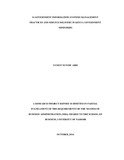| dc.description.abstract | Since the widespread commercial availability of computing technologies, information
systems have been the dominant application area of computing. Organizations large
and small, private and public, have come to rely on information systems for their dayto-
day operation, planning, and decision making. Effective use of information
technologies has become a critical success factor in modern society. Yet, success is
not easily achieved. E-government is not a new concept, in that the business of
government through its ministries in most countries has for many years employed
ICT, in communications, administrative systems, data gathering and storage, security
and surveillance, and dissemination of information. The study sought to establish how
E-government information systems management practices affect service delivery in
Kenya Government Ministries. The study adopted a descriptive survey research
design. The target population comprised of all the systems under E-government in the
18 Government Ministries in Kenya as at June 30th 2014. Primary data was collected
using a questionnaire. The completed questionnaires were edited for completeness
and consistency. Quantitative data collected was analyzed by the use of descriptive
statistics such as frequencies, percentages, mean scores, standard deviations using the
statistical package for social sciences (SPSS V.21). The information collected was
presented using frequency tables, graphs and pie charts. In addition, the researcher
conducted a Pearson’s product moment correlation analysis and multiple regression
analysis in order to establish the effects of each of the five ISM practices on service
delivery in the government ministries. The study found out that there is a common
network computing and information infrastructure that is readily accessible to
everyone in the ministry thus improving service quality to the public as shown by a
mean score of 4.491. The study found that ISM lifecycle activities (Systemic
Processes) that affect service delivery at the ministry to a great extent are maintenance
and evolution as shown by a mean score of 4.423, verification and validation
including testing as indicated by a mean score of 4.383, operations and support as
expressed by a mean score of 4.379, requirements elicitation as indicated by a mean
score of 4.373, IS design as shown by a mean score of 4.215, IS planning as expressed
by a mean score of 4.194, IS analysis and IS specification as indicated by a mean
score of 4.162 and 4.115 respectively. The study concludes that people familiarity
with the IS application domain, Degrees of task specialization among the IT staff,
Application Servers and LAN/WAN maintenance, IS design, planning, analysis and
specification affect the service delivery in government ministries in Kenya. The study
recommended that the government ministries should aim at improving their
infrastructure by employing effective infrastructure management strategies to improve
the service delivery. The study further recommends that the human resource should be
equipped with the necessary skills to manage the systems and awarded appropriate
rewards as they are crucial determinant of the quality service at the ministries.
Systems should be updated regularly to improve quality of decision making and
service delivery. | en_US |

